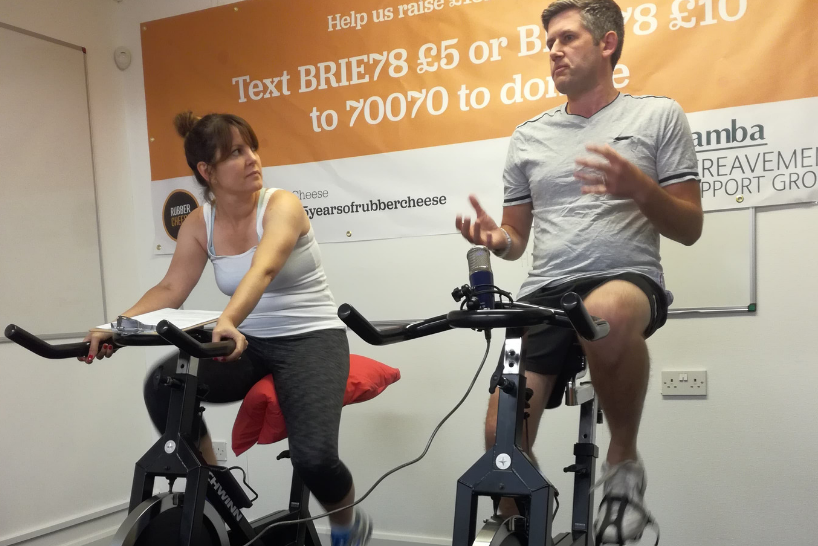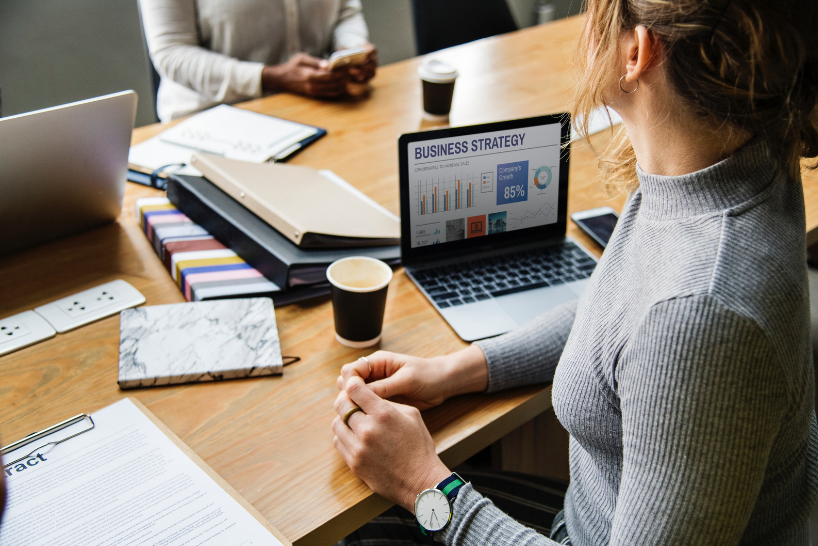If you follow Rubber Cheese on social media, you’ll know all about the #15yearsofRubberCheese charity cycle we completed.
Walking in the footsteps of Sir Bradley Wiggins, Victoria Pendleton and Mark Cavendish, we rode a whopping 15 hours between us (thankfully, on stationary bikes from the comfort of our air-conditioned office).
We live-streamed the event on Facebook and, throughout the day, our Managing Director, Kelly Molson, picked the brains of three business founders while she pedalled.
One of those founders was Blake Henegan, founder of Optimus Learning Services.
Since 2009, Blake and his team have been trailblazers in the world of learning and development. He believes every business should invest in the professional growth of their employees (and rightly so!).
Keep reading for some juicy interview highlights.
The Interview
Hi Blake, it’s lovely to have you in. Let’s begin with your career history. How did you arrive here, a Managing Director of your own company?
You could say I have entrepreneurship in my genes. My parents had two successful businesses, as did my granddads. Maybe, we just don’t like being told what to do by other people!
I followed a traditional educational route. After A-levels, I went to university and somehow got a degree. From there, I worked at various sized organisations within the learning and development space.
I took the plunge and set up my own business in 2009, after realising there was a gap in the market to help small and one person L&D teams.
The recession helped in many ways. L&D teams had reduced in size but were still expected to deliver all this great training and support. It just isn’t achievable.
That sounds like quite a smooth trajectory.
Oh, the reality was very different. It always sounds easier on paper.
My initial business plan disappeared after a year. I had to evolve and adapt plans along the way.
Starting a business is a massive learning curve like that.
I can imagine! So, how does Optimus specifically help its clients?
Basically, we provide an outsourced L&D team for organisations who need a bit more support.
Many teams are under-resourced. There might be one L&D manager for every thousand employees.
That person is expected to work on strategy, support business development and deliver training. There are simply not enough hours in a day.
Businesses use us as an extension of their team. We manage admin and minimises the mundane so our clients can use their time and talent in the right way. We also provide strategic support and source training.
Companies now recognise they have to invest in people, so we’re always busy.

Busy is good! You mentioned Optimus came about because there was a gap in the market, but it sounds like you have a real enthusiasm for what you do as well.
Absolutely. The majority of people in L&D love helping others. I know it sounds cheesy, but I feel like I’m making a difference.
Here’s a big question – how did you choose the name Optimus?
I wish I had a better story but, the truth is, we picked names until one stuck.
It needed to be something that represented my core values and our wider business values. These include continually improving and integrity. Plus, it needed to be something that stood out.
I stumbled on Optimus, it means “the best” in Latin, and the rest is history.
The only downside? I always get asked if I’m a fan of Transformers. I am, but that’s not why I chose the name.
Of course, Optimus Prime! And what does a typical day look like for you?
When you’re running a business, there isn’t really a typical day.
I’ve learnt to broadly schedule my time. Monday is about strategy, marketing and content creation, Tuesday to Thursday is reserved for client meetings and prospects, then I review the week on Friday.
Obviously, some weeks are spent doing something completely different. It’s really hard to predict.
What percentage of the time would you say you’re out the office meeting people?
It doesn’t happen as much as it used to because a lot of communication is done online now. People are time-poor. I’d say, maybe, one day a week.
I like meeting people face-to-face because you get more out of the conversation but, as a business owner, you do have to be conscious of how you spend your time.

It must be difficult to run at maximum efficiency all the time. How do you find motivation when things get tough?
There are ups and downs with everything in life. Running a business is no different.
Some of my motivation is intrinsic. Other times, I draw it from those around me. My wife, children, parents, sisters and friends. Everyone who continues to back me. Really, I just want to make myself and my loved ones proud.
We’ve just finished our fourth year of continued growth – I couldn’t have done it without them.
Do you think motivation is a skill that can be developed?
Interesting question! I think humans can get lazy – we like the path of least resistance
Sometimes, you need to step back from a project and let ideas develop. However, you can deliberately form habits to lean on when motivation is low.
Momentum builds motivation. Sometimes the best thing you can do is just start something, even if it’s difficult and especially if it’s not perfect. If you spend too long stressing over the details, work become insurmountable.
It’s easy to procrastinate – I’m guilty of it. But if you just push through and get past that first ten minutes of a tricky task, things begin to flow.
And what about support networks? Do you have professional groups to draw inspiration from?
I’ve had business coaches in the past and currently, I’m working with a mentor. He’s a former business owner who’s very analytical and loves planning. Admittedly, my weaker areas.
As well as making me think about new concepts, there’s a level of accountability with a mentor that makes me work harder. We meet weekly to discuss business challenges, goals and current projects.
The partnership has definitely had an amazing impact on business.
Do you have specific networking groups you’re a part of?
I go to what I fancy, really.
For a year and a half, I was a part of BNI. I met some amazing people but the weekly format didn’t work for me. Plus, it was pretty formal.
I don’t network so much anymore because I wasn’t seeing results – it’s hit and miss. There’s really no such thing as a perfect networking group because it all depends on the people.

What if someone asked for your mentorship? What advice would you give a person who’s just started a business?
How long have you got?
Plan the work and work the plan. It’s really important to give yourself goals and mini-goals. That way, even in times of doubt, you have something solid to work towards. Along with this comes discipline – stay on track and hit those targets.
Make sure you celebrate success and don’t beat yourself up over losses. We can be self-critical but running a business is an achievement in itself.
Going back to efficiency, learn to say no and be selfish with your time. This can be difficult for us because we’re British and too polite!
This leads me onto my final piece of advice – don’t chase every piece of business. Use your focus properly and invest your energy in mutually beneficial partnerships.
Going back to celebrating success, is there a project or accomplishment you’re especially proud of?
I recently appeared on Learning Now TV. It’s an internet programme with inspirational interviews, discussions and advice for those working in L&D.
That was amazing. Everyone on that programme is a thought-leader and I have an incredible amount of respect for contributors. Being invited to speak was like being accepted into the fold. My opinions and insights mattered.
So that, and getting the business to where it is today. When you start a business, the stats are against you. But we’re in our tenth year of trading now.
They are massive successes. Learning Now TV sounds fantastic. Did you get nervous? You wrote a blog recently on imposter syndrome – does that crop up when you’re appearing on massive channels like that?
Oh yes! Nerves are natural and I think everyone experiences imposter syndrome at some point.
For some, it’s crippling and keeps them stuck in their comfort zone but others are able to move past it. That’s the difference. You must learn to silence negative thoughts and take action regardless.
I strongly believe failure is a learning opportunity. It’s better to focus on behaviour and effort over results.
How do you market your business?
I use different channels. I’m on social media – LinkedIn is particularly effective. There’s also networking and, for us, a huge driver of business is referrals and warm leads.
I’m really lucky because I’ve been invited to speak at several high-profile events. In fact, we’re exhibiting at the World of Learning conference soon, in the NEC, Birmingham.

It sounds like you’re always on your feet! What do you do for downtime?
I play the guitar, read, watch films and spend a lot of time with family.
I’ve been playing the guitar for a year and a half – I dedicate 15 – 30 minutes to it each day. An instrument is a wonderful way to stay disciplined
And how do you see your business developing in the future?
It’s a really exciting time for Optimus and we’ve started working with some big names like MasterCard, Jimmy Choo and Arcadia Group.
We’ve expanded our reach into mainland Europe but I don’t know what Brexit will bring. I have an eye on this. We’re also developing our technology capability – we’ll be announcing some exciting things in 2019.
Eventually, way down the line, I would love to step back. That’s the dream. Actually, I think it’s every business owner’s dream! It’d be wonderful to hand some of the legwork over so I could focus on development.
As a side project, I’m going to set up a business coaching service to help new founders.
Lastly, if you hadn’t got into L&D, what sort of business would you have liked to run?
I love music! I would be a promoter or a band manager. I’m a rock star at heart, really.

How you can help
The fundraiser isn’t over yet! You can still help us reach our goal.
Head over to our JustGiving page to donate OR text ‘BRIE78 £5’ or ‘BRIE78 £10’ to 70070. Every contribution is greatly appreciated.
Why are we doing this?
The Tamba Bereavement Support Group (BSG) exists to support all parents and carers of multiples who have experienced loss whether it was during pregnancy, at birth or at any point afterwards. It is a charity extremely close to the heart of our MD Kelly and her partner Lee after losing their twin girls Lily May and Ava Allison in 2017. We’re raising money to help them continue their amazing work.
Like this blog? Then read How to Create Extraordinary Videos With Tony Slater and The World of Wedding Photography With Lee Allison.

Related articles
Interviews
How to create extraordinary videos with Tony Slater
Interviews
The world of wedding photography with Lee Allison
Interviews
Interview with Sophie Ballinger, Communications Manager at Eureka! The National Children’s Museum